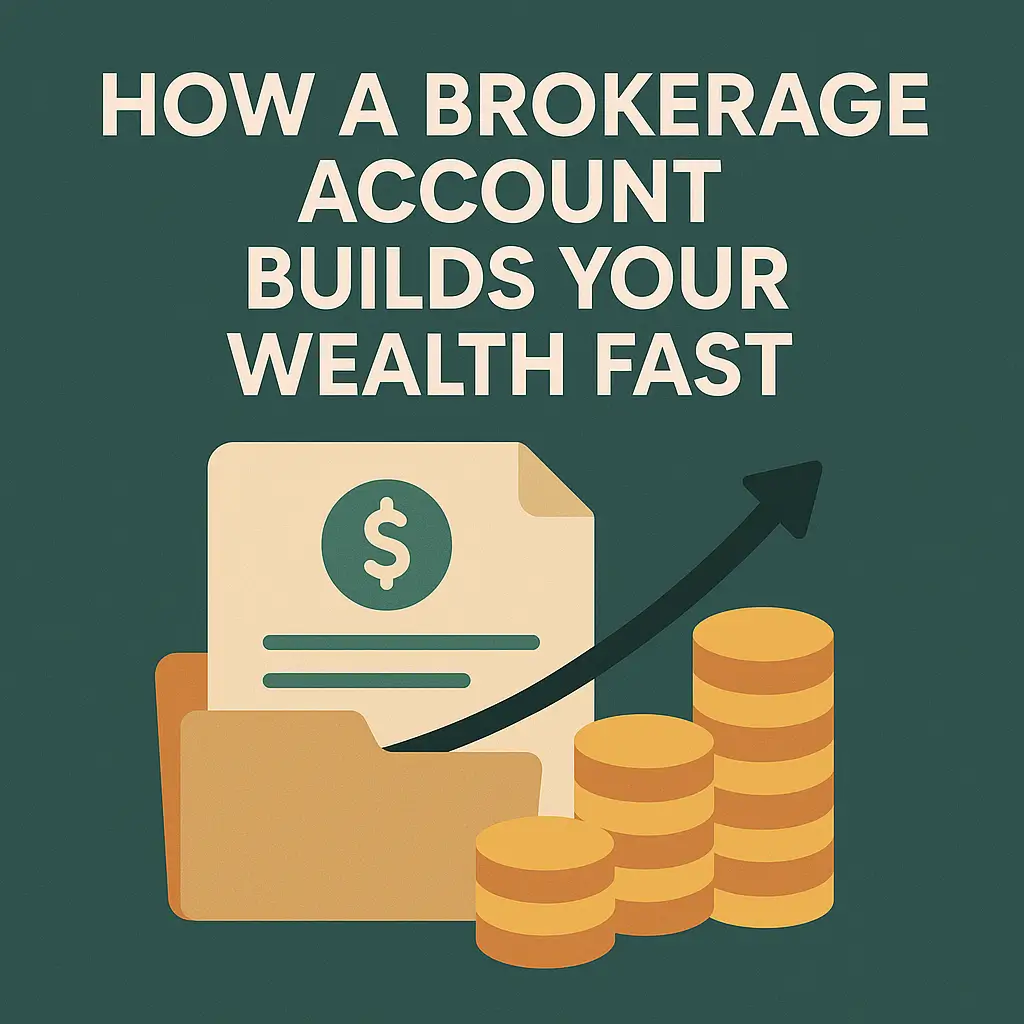“What if you could turn 500/month into 1M? A brokerage account makes it possible.”
While savings accounts offer safety, they grow wealth at a glacial pace—averaging just 0.5% annually. Compare that to the stock market’s historic 10% average return, and it’s clear why a brokerage account is the ultimate wealth accelerator.
Unlike restricted retirement accounts or low-yield savings, a brokerage account gives you:
- Full market access (stocks, ETFs, real estate, crypto)
- Liquidity (buy/sell anytime without penalties)
- Compounding superpowers (reinvest dividends for exponential growth)
Whether you’re starting with 100or100or10,000, a brokerage account unlocks tools to build wealth faster than traditional options. Ready to harness its potential? Let’s explore the following points:
- How Brokerage Accounts Supercharge Growth
- 3 Fast-Track Strategies for Rapid Wealth Growth
- Brokerage vs. Other Accounts: Where to Grow Your Wealth
- Pitfalls to Avoid When Using a Brokerage Account
- Documents Required to Open a Brokerage Account
- How to Start Building Wealth Today
- Conclusion: Your Path to Faster Wealth Starts Now
- Frequently Asked Questions

How Brokerage Accounts Supercharge Growth
1. Market Access = Higher Returns
Unlike savings accounts that earn pennies, a brokerage account unlocks the full power of financial markets through:
- Stocks (individual companies like Apple or Tesla)
- ETFs (like those covered in the ETF Investing Guide)
- Bonds (including Treasury bills)
Real-world comparison:
- 10,000 in savings at 0.510,000 in savings at 0.510,511 after 10 years
- 25,937 after 10 years
2. Compounding on Steroids
The real magic happens when you reinvest earnings:
- Dividend reinvestment (DRIP) turns small payouts into major holdings
- **500/month∗∗at 7500/month∗∗at 71 M+ in 30 years (see compound interest math)
3. Tax Advantages
Brokerage accounts offer unique tax benefits:
- Long-term capital gains rates (15% vs ordinary income tax)
- Tax-loss harvesting strategies (explained in our Capital Gains Guide)
3 Fast-Track Strategies for Rapid Wealth Growth
1. ETF Investing (Set-and-Forget Wealth)
For hands-off investors, low-cost index ETFs like VTI (Total Market) and VOO (S&P 500) offer:
- Instant diversification across hundreds of stocks
- Expense ratios under 0.10% (vs. 1%+ for managed funds)
- Historical returns matching the broader market
Pro Tip: Pair with dollar-cost averaging to smooth out market volatility.
2. Dividend Snowballing
Turn dividend stocks into wealth machines with:
- DRIP (Dividend Reinvestment Plans): Automatically buy more shares with payouts
- Compound growth effect (see real-world examples)
- Focus on “Dividend Aristocrats” with 25+ years of payout growth
3. Sector Rotation
Capitalize on emerging trends by:
- Shifting 10-20% of a portfolio to high-growth sectors (tech, renewable energy)
- Using sector-specific ETFs for targeted exposure
- Rebalancing quarterly to lock in gains
Bonus Strategy: Explore alternative investments for 5-10% of your portfolio.

Brokerage vs. Other Accounts: Where to Grow Your Wealth
Key Differences at a Glance
| Feature | Brokerage Account | 401(k)/IRA | Savings Account |
|---|---|---|---|
| Liquidity | Instant access | Early withdrawal penalties (10%+) | Instant access |
| Contribution Limits | None | 6.5k−6.5k−22.5k annually | None |
| Growth Potential | 10%+ (market returns) | 10%+ (market returns) | <1% (current rates) |
| Tax Advantages | Long-term capital gains rates | Tax-deferred/tax-free growth | None |
| Investment Options | Stocks, ETFs, bonds, alternatives | Limited to plan offerings | None |
Why a Brokerage Account Wins for Fast Growth
- No Contribution Ceilings
- Unlike retirement accounts, you can invest unlimited amounts whenever you want
- Withdraw Anytime Without Penalty
- Need cash? Sell investments instantly (vs. IRA/401(k) lock-up periods)
- Full Market Access
- Invest in individual stocks, sector ETFs, or even crypto
Best For: Investors who want liquidity + unlimited growth potential.
When to Use Other Accounts
- 401(k)/IRA: Maximize first for retirement savings (tax benefits)
- Savings: Emergency funds only (learn about high-yield options)
Pro Tip: Use all three strategically – max out retirement accounts first, then brokerage for additional growth.
Pitfalls to Avoid When Using a Brokerage Account
1. Overtrading – How Fees Destroy Returns
- Every trade costs you:
- Commission fees (even “$0” platforms have spreads)
- Tax triggers (short-term capital gains rates up to 37%)
- Solution: Adopt a buy-and-hold strategy with quarterly check-ins
2. Emotional Selling – The #1 Wealth Killer
- Fact: Missing just the 10 best market days cuts returns by 50% over 20 years
- Common mistakes:
- Panic-selling during dips
- Chasing “hot” stocks (buying high, selling low)
- Solution: Automate investments via dollar-cost averaging.
3. Ignoring Hidden Fees
Even small fees compound over time:
- 1% annual fee = 30,000+loston30,000+loston100k over 20 years
- Watch for:
- Expense ratios >0.20%
- Inactivity fees
- Mutual fund load fees
- Solution: Use low-cost index funds and compare platforms
Pro Tip: Set up price alerts instead of constantly checking your portfolio to avoid emotional decisions.
Documents Required to Open a Brokerage Account
What You’ll Need to Get Started
Opening a brokerage account is quick, but you’ll need these documents ready:
1. Personal Identification
- Government-issued ID: Driver’s license, passport, or state ID
- Social Security Number (SSN) or Tax ID: Required for tax reporting
2. Proof of Address
- Recent utility bill, bank statement, or lease agreement (must show your name and address)
3. Employment & Financial Details
- Annual income & net worth (used to determine account eligibility)
- Employer information (for some brokerages)
4. Funding Method
- Bank account details (routing & account number) for transfers
- Debit/credit card (for instant deposits on some platforms)
Special Cases
- Trusts/Retirement Accounts: May require additional paperwork (trust agreements, beneficiary forms)
- Non-U.S. Residents: Some brokerages accept ITINs instead of SSNs.
Pro Tip: Most platforms let you upload documents digitally—no need to visit an office.
How to Start Building Wealth Today
1. Pick the Right Platform
Choose a brokerage that fits your needs:
- Fidelity/Schwab (Best for long-term investors)
- Robust research tools
- Fractional shares
- Robinhood/Webull (Best for beginners)
- Simple mobile interface
- $0 commissions
- Vanguard (Best for index investors)
Key Features to Compare: Fees, investment options, and educational resources.
2. Fund Your Account
- Minimums: Start with as little as $100 (learn how in our beginner’s investing guide)
- Transfer Methods:
- Bank transfer (1-3 business days)
- Instant deposit options (up to $1,000)
- Smart Funding Tip: Start with an amount you won’t need for 5+ years
3. Invest Consistently
Automation is the key to growing wealth:
- Set up recurring deposits (e.g., $100/week)
- Use fractional shares to buy expensive stocks (like Amazon) with small amounts
- Reinvest dividends automatically (DRIP)
First Investment Ideas:
- ETF: VTI (Total Stock Market)
- Stock: SPY (S&P 500 Index)
- Bond: BND (Total Bond Market).
Conclusion: Your Path to Faster Wealth Starts Now
A brokerage account isn’t just another financial product—it’s your gateway to market-beating returns, compounding growth, and financial freedom. Unlike savings accounts that barely keep up with inflation or retirement accounts with strict limits, a brokerage gives you the flexibility and firepower to build wealth on your terms.
Key Takeaways
✔ Higher growth potential – Earn 10%+ annually (vs. <1% in savings)
✔ Total control – Invest in stocks, ETFs, or alternatives with no contribution limits
✔ Tax-smart strategies – Leverage long-term capital gains and loss harvesting
Free Bonus
Download the Brokerage Account Checklist to:
- Compare platforms side-by-side
- Avoid common new-investor mistakes
- Set up your first investments correctly
The best time to start was yesterday. The second-best time? Today.
Frequently Asked Questions
1. How much money do I need to open a brokerage account?
Most online brokerages have no minimum to open an account, though some require 100−100−500 to start investing. Platforms like Robinhood and Webull allow $0 minimums.
2. Are brokerage accounts safe?
Yes—brokerage accounts at SIPC-insured firms (like Fidelity or Schwab) protect up to **500,000∗∗(including 500,000∗∗$ 250,000 in cash) if the brokerage fails.
3. How do I avoid fees when trading?
- Choose $0-commission platforms (e.g., Fidelity, Charles Schwab)
- Avoid frequent trading (which can trigger fees or taxes)
- Watch for expense ratios in ETFs/mutual funds
4. Can I lose money in a brokerage account?
Yes—investments aren’t FDIC-insured like savings accounts. Diversify and hold long-term to mitigate risk.
5. How are brokerage accounts taxed?
- Capital gains tax: 15% for long-term (>1 year), up to 37% for short-term
- Dividends: Taxed as income unless qualified (15% rate)
- Learn more: Capital Gains Explained
6. Can I withdraw money anytime?
Yes! Unlike 401(k)s/IRAs, brokerage accounts have no withdrawal penalties (though selling investments may trigger taxes).
7. What’s the difference between a brokerage and a Roth IRA?
- Brokerage: No tax benefits, but no contribution limits or withdrawal rules
- Roth IRA: Tax-free growth, but capped contributions ($7,000/year)
- Compare: Roth IRA Basics
8. How do I choose investments as a beginner?
Start with:
- Index ETFs (VTI, VOO)
- Robo-advisors (automated portfolios)
- Guide: Investing for Beginners

